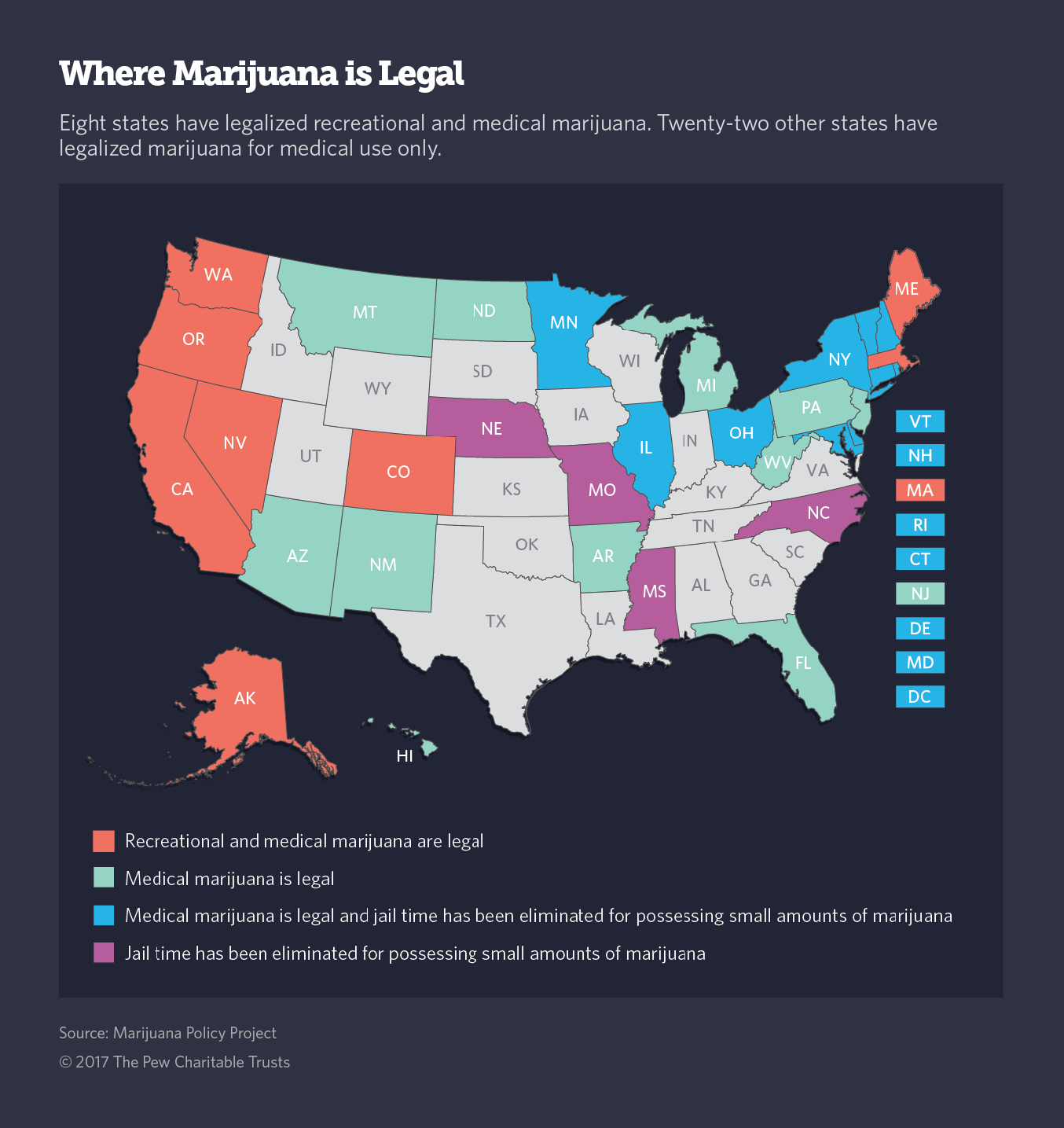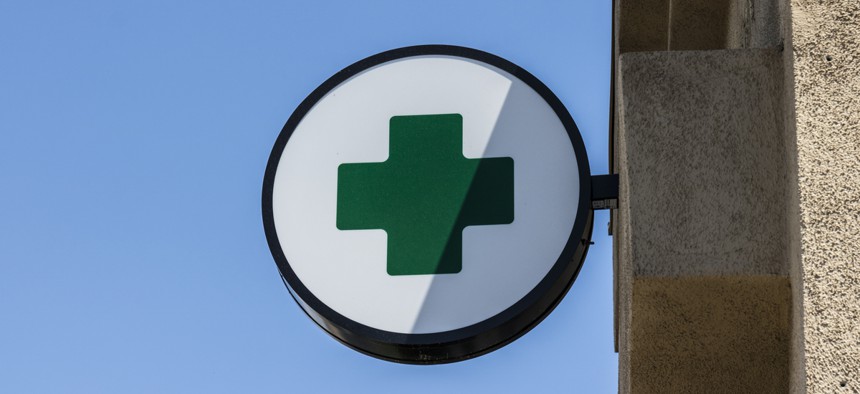Connecting state and local government leaders
Although some lawmakers have tried, no state legislature has yet carved out rules for cannabis lounges, cafes or tasting rooms.
This article was originally published by Stateline, an initiative of The Pew Charitable Trusts, and was written by Sophie Quinton.
Las Vegas’ reputation as a place where you can indulge your vices and have a good time helps it lure some 43 million visitors a year. But tourists heading to Sin City hoping to consume newly legal cannabis have a problem: There are few places in town, other than private homes, where someone can legally light up a joint.
In Nevada and the seven other states that allow people to consume marijuana for fun, it’s typically illegal to smoke or ingest the drug in dispensaries, bars, restaurants, city parks and public streets. Hotels and landlords often ban people from using the drug on their property.
“The next frontier is: Where do people use it?” said Nevada state Sen. Tick Segerblom, a Democrat who advocated for marijuana legalization. He said that creating lounges where people can legally consume the cannabis products they buy is the logical solution.
Although lawmakers have tried, no state legislature has yet carved out rules for cannabis lounges, cafes or tasting rooms.
Policymakers in Colorado, Washington and Oregon have struggled to reconcile proposed rules with other state laws such as indoor smoking bans. Lawmakers also fear that marijuana lounges could create public health and safety problems—such as increasing drugged driving—and trigger a federal crackdown.
Some cities, including Denver and Colorado Springs, have created temporary rules for lounges. But cities run into the same legal issues as states.
Entrepreneurs are opening up marijuana lounges anyway, creating problems for law enforcement. It’s typically legal for people to get together to form a private club that permits marijuana consumption. But it can be difficult to determine what is truly a private club, and many of the pot clubs advertised online in states such as Colorado aren’t private, but are open to the public.
The four states where ballot initiatives legalized recreational marijuana last year may have the best chance of finding a solution. Nevada allows smoking inside many bars and clubs, for instance, so pot lounge proposals raise fewer concerns about indoor air quality.
And the ballot initiatives approved in California and Maine last year open the door to legal lounges. California’s initiative says cities and counties can choose to allow smoking, vaporizing and ingesting marijuana at some retail stores and other businesses. Maine’s initiative included rules for licensed marijuana clubs.

A Murky Legal Area
Clean air rules, unanswered health and safety questions, and political divisions have all stalled progress on legalizing social consumption, said Andrew Freedman, a consultant who formerly served as Colorado’s director of marijuana coordination.
“It’s just a very divisive area,” he said. Even industry leaders are split on whether such lounges should be allowed.
In Oregon, the state’s ban on smoking cigarettes, e-cigarettes and other inhalants in workplaces has been a sticking point for lawmakers. A bill proposed this year to legalize pot lounges didn’t make it out of committee, derailed by concerns that it would weaken air quality rules and set a bad example. Similar criticism felled a Colorado bill that would have allowed consumption clubs to sell marijuana products and exempted them from clean indoor air requirements.
Alaska law permits people to consume marijuana at a dispensary. But for a year and a half, policymakers there have struggled to come up with rules for marijuana tasting rooms, dogged by questions about air quality, how to measure cannabis intoxication, and other issues such as whether to set purchase limits or ban happy hours.
In theory, it shouldn’t be this hard to come up with a policy solution. “The same questions that have been asked regarding public use of alcohol or smoking are the same kinds of questions that get presented when talking about cannabis,” said Colorado state Rep. Dan Pabon, a Democrat who represents part of Denver.
Policymakers ultimately have to weigh non-cannabis consumers’ right to be free of the drug against cannabis consumers’ right to use it, he said. But it’s harder to strike that balance for cannabis than for tobacco, because there’s not much research on how cannabis smoke affects bystanders. “That’s kind of keeping things at bay,” he said.
State inaction has left localities in a bind.
When the Clark County Commission, which has jurisdiction over the Las Vegas Strip, raised the marijuana lounge issue in a September meeting, they confronted a fundamental question: Does the county have legal authority to license such lounges?
The statewide ballot initiative that legalized the drug doesn’t make that explicit. Days before the commission met, lawyers for the state Legislature had found that localities have the authority to license marijuana lounges. But the Nevada attorney general hadn’t weighed in on whether pot lounges are legal—his office has since declined to do so—and Gov. Brian Sandoval, a Republican, had said marijuana lounges need to be regulated at the state level.
“I am concerned with these establishments popping up piecemeal throughout the state with differing rules and regulatory structure,” Sandoval said in a statement released to local news outlets. A fragmented system could fail to meet federal guidelines, he said.
Faced with so much uncertainty, the seven commissioners decided to table their discussion. Commissioner James Gibson suggested that they wait and see what other localities do. “I don’t see any reason why we have to be first,” he said. “But we certainly have to be right.”
How Denver Moved Forward
Denver is one of a handful of cities that have created rules for lounges, so officials around the country are watching it closely. Denver was forced to create rules for social consumption by a 2016 ballot initiative.
Initially proponents wanted to open the door to legal consumption in bars, restaurants and concert halls. But it soon became clear that that would be impossible, says University of Denver professor Sam Kamin, an expert on marijuana law.
The city’s lawyers could get around the state ban on “open and public consumption” of marijuana by defining a “public place” to be somewhere with no restrictions on public access. The ballot initiative already forbade people younger than 21 from entering a cannabis consumption area.
But other state laws and regulations left the city little room to maneuver. Colorado’s liquor licensing board bans marijuana consumption at establishments that hold a liquor license. Colorado’s Clean Indoor Air Act forbids smoking inside at almost all businesses, restricting marijuana consumption to vaping and edibles.
And under Colorado and Denver law, only licensed dispensaries can sell marijuana products. At the same time, people can’t consume marijuana at a dispensary. That meant that the city could create licenses only for “bring your own cannabis” venues.
Denver began accepting applications for social consumption licenses in July. No business or special event has yet been approved, officials say.
The biggest challenge for would-be pot lounge entrepreneurs is how to make money without selling marijuana products, said Molly Duplechian, a deputy director of policy at the Denver Office of Marijuana Policy. “They have to have something else to have a true business model.”
Emmett Reistroffer of Denver Relief Consulting, the firm that led the city ballot initiative campaign, said the biggest roadblock is the city’s zoning restrictions. Denver won’t issue licenses to businesses or events that are within 1,000 feet of schools, child care centers, alcohol and drug treatment facilities, and city recreation centers and pools — which, Reistroffer said, rules out most of the city.
Even with rules for social consumption on the books, Denver’s problems with public use are far from over. Officials still need to police illegal pot clubs, issue citations to people caught smoking joints in city streets, and monitor marijuana festivals that inspire crowds to light up in city parks.
If the state created rules for social consumption, Duplechian said, that would make Denver’s life easier.
State lawmakers will have to keep returning to the issue because Colorado has essentially legalized the sale and cultivation of marijuana while creating a black market for use, Pabon said. “I don’t think it’s an issue that’s going to go away.”

NEXT STORY: In Tuesday’s Off-Year Elections, Who Won the Big Mayoral Races?



